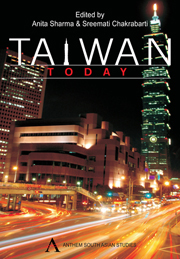Book contents
- Frontmatter
- Contents
- Acknowledgements
- Contributors to this Volume
- Acronyms and Abbreviations
- Foreword
- Introduction
- 1 Who are We? Identity in Transition
- 2 Taiwan: Yearning for an Identity
- 3 The Implications of Direct Flights: Beijing in Taiwanese Politics
- 4 Kuomintang, Democratization and the One-China Principle
- 5 The Deepening and Consolidation of Democracy in Taiwan
- 6 India and Taiwan: Bolstering Complementarity in Information Technology
- 7 Asian Regional Economic Integration and Taiwan–India Economic Relations
- 8 The Taiwan Factor in Sino–Indian Relations
- 9 Japan's Triumphant Diplomacy in Taiwan in 1874
- 10 A Study of the Cultural and Educational Exchanges between Taiwan and India, 1995–2006
- 11 Between Two Worlds: A Survey of Education in Taiwan
- 12 Female Immigrants, Social Capital and Public Sphere in Taiwan
- 13 Information Technology and Gender: Taiwan and India
- 14 Tzu Chi: A Case Study of Engaged Buddhism in Taiwan
- 15 Master Hsing Yun of Fo Guang Shan and the Development of Humanistic Buddhism
- 16 The Heritage and Innovation of Chan Paintings in Taiwan
- 17 Taiwan in World Architecture: A Historical Perspective
- Afterword
10 - A Study of the Cultural and Educational Exchanges between Taiwan and India, 1995–2006
Published online by Cambridge University Press: 05 March 2012
- Frontmatter
- Contents
- Acknowledgements
- Contributors to this Volume
- Acronyms and Abbreviations
- Foreword
- Introduction
- 1 Who are We? Identity in Transition
- 2 Taiwan: Yearning for an Identity
- 3 The Implications of Direct Flights: Beijing in Taiwanese Politics
- 4 Kuomintang, Democratization and the One-China Principle
- 5 The Deepening and Consolidation of Democracy in Taiwan
- 6 India and Taiwan: Bolstering Complementarity in Information Technology
- 7 Asian Regional Economic Integration and Taiwan–India Economic Relations
- 8 The Taiwan Factor in Sino–Indian Relations
- 9 Japan's Triumphant Diplomacy in Taiwan in 1874
- 10 A Study of the Cultural and Educational Exchanges between Taiwan and India, 1995–2006
- 11 Between Two Worlds: A Survey of Education in Taiwan
- 12 Female Immigrants, Social Capital and Public Sphere in Taiwan
- 13 Information Technology and Gender: Taiwan and India
- 14 Tzu Chi: A Case Study of Engaged Buddhism in Taiwan
- 15 Master Hsing Yun of Fo Guang Shan and the Development of Humanistic Buddhism
- 16 The Heritage and Innovation of Chan Paintings in Taiwan
- 17 Taiwan in World Architecture: A Historical Perspective
- Afterword
Summary
INTRODUCTION
According to Article I of the Constitution of the United Nations Educational, Scientific and Cultural Organization (UNESCO):
The purpose of the organization is to contribute to peace and security by promoting collaboration among the nations through education, science and culture in order to further universal respect for justice, for the rule of law, and for the human rights and fundamental freedoms which are affirmed for the people of the world, without distinction of race, sex, language or religion, by the Charter of the United Nations (UN).
The philosophy of UNESCO's Constitution according to Hans J Morgenthau, a well-known realist in the field of international relations, assumes that ‘education, cultural exchange, and in general, all activities that tend to increase contacts among members of different nations and make them understand each other contribute necessarily to the creation of an international community and the maintenance of peace’. However, Morgenthau argued that this assumption was wrong. Morgenthau insisted that increased understanding did not necessarily result in increased friendship. Moreover Morgenthau maintained that ‘the more thoroughly one understands the other side's position, character, and intention, the more inevitable the conflict often appears to be’.
Although Morgenthau took a very pessimistic view of the role played by UNESCO, the successful formation of the European Union (EU) and the contribution of the Confidence Building Measures (CBMs) to the reduction of tensions between rival countries have vindicated the UNESCO.
- Type
- Chapter
- Information
- Taiwan Today , pp. 130 - 139Publisher: Anthem PressPrint publication year: 2010



